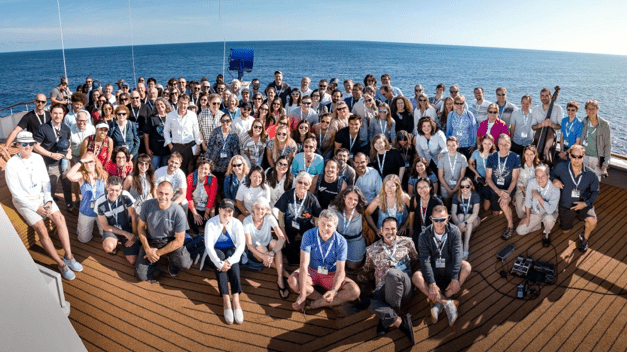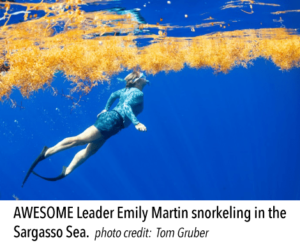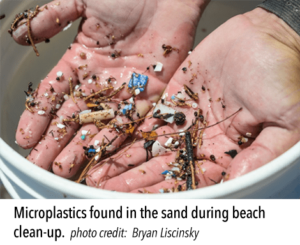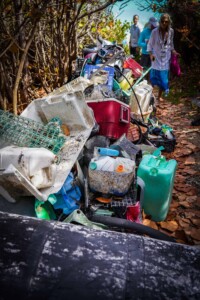Four AWESOME leaders joined an expedition to get a rare look at the collection of plastic waste in the North Atlantic gyre off the coast of Bermuda. The participants of the “Ocean Plastics Leadership Summit,” numbering approximately 140, included plastics industry executives from all parts of the supply chain, ranging from petrochemical producers, plastics packagers, consumer packaged goods, and logistics providers, as well as individuals representing NGOs, media and think tanks.

According to Ann Drake, founder of AWESOME and one of the AWESOME leaders who participated, “Global sustainability is a growing part of the supply chain leader’s responsibility.”
The others who attended are Nancy Nix, AWESOME Executive Director Emeritus; Micaela Bulich, Operating Advisor, Supply Chain & Procurement, with Clayton, Dubilier & Rice; and Emily Martin, Chief Commercial Officer, GE Hitachi Nuclear Energy. Micaela is an AWESOME Advisor and served as a member of the Ocean Plastics Advisory Board. She is the former Vice President Global Supply Chain for GE Renewable Energy’s $8 billion Onshore Wind business.
 Micaela also attended a senior leader climate change expedition to Antarctica in 2017.
Micaela also attended a senior leader climate change expedition to Antarctica in 2017.
The North Atlantic gyre is one of five gyres, which are large systems of circulating ocean currents. For this expedition about 140 people traveled aboard a ship named The RCGS Resolute to the Sargasso Sea off the coast of Bermuda. There they had the opportunity to open ocean snorkel and trawl for debris.
 According to Micaela Bulich, “We found random pieces of plastics including small pieces of plastic, plastic silverware, bottle caps, and even a planter liner. The pieces collected showed evidence of fish eating the plastic – and when fish ingest micro plastic, those substances are entering our human food supply.”
According to Micaela Bulich, “We found random pieces of plastics including small pieces of plastic, plastic silverware, bottle caps, and even a planter liner. The pieces collected showed evidence of fish eating the plastic – and when fish ingest micro plastic, those substances are entering our human food supply.”
When aboard board The RCGS Resolute, the participants divided into 14 work streams focusing on different aspects of the ocean plastic problem.
 While participating in the group focusing on eliminating non-essential single use plastic, Micaela says she was surprised to learn that 23% of single-use plastic is generated in a dine-in restaurant setting. “The group shared that some progressive communities such as Berkeley, California, have passed an ordinance to reduce single use foodware waste. This will require food vendors offering eat in dining to use reusable foodware. We learned there are grants available to help food vendors establish new facilities to meet this reusable requirement. We learned of progressive new businesses that are partnering with event venues to bring rented reusable cups as a strategy to reduce single use waste. There’s great work underway across the country to challenge the single use disposable today reality and create new reusable solutions,” explained Micaela.
While participating in the group focusing on eliminating non-essential single use plastic, Micaela says she was surprised to learn that 23% of single-use plastic is generated in a dine-in restaurant setting. “The group shared that some progressive communities such as Berkeley, California, have passed an ordinance to reduce single use foodware waste. This will require food vendors offering eat in dining to use reusable foodware. We learned there are grants available to help food vendors establish new facilities to meet this reusable requirement. We learned of progressive new businesses that are partnering with event venues to bring rented reusable cups as a strategy to reduce single use waste. There’s great work underway across the country to challenge the single use disposable today reality and create new reusable solutions,” explained Micaela.
The mission of the Ocean Plastics Leadership Summit is described as aiming to “mobilize organizations in the plastic value chain to showcase solutions, highlight new initiatives that can address pressing challenges facing our oceans and inspire partnerships, joint ventures, and R&D initiatives.” Learn more on their website or by viewing this video.
National Geographic participated in Summit, as did Laura Parker, the author of an impactful article titled “Planet or Plastic” published by National Geographic in June 2018. An excellent source of information on the problem of plastic waste, this article provides an in-depth description and alarming statistics.
In that issue, Ted Siegler, a Vermont resource economist who has spent more than 25 years working with developing nations on garbage, is quoted as saying. “This isn’t a problem where we don’t know what the solution is…We know how to pick up garbage. Anyone can do it. We know how to dispose of it. We know how to recycle. It’s a matter of building the necessary institutions and systems, —ideally before the ocean turns, irretrievably and for centuries to come, into a thin soup of plastic.”